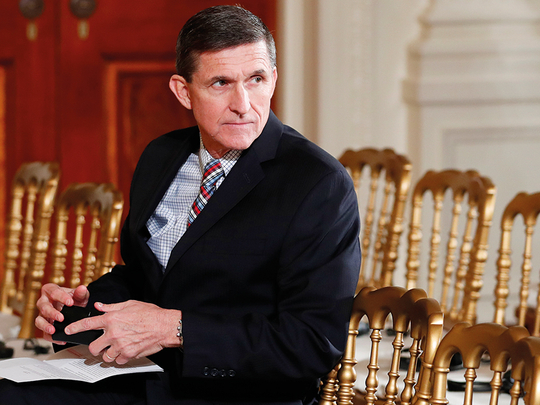
WASHINGTON: Former national security adviser Michael Flynn was paid more than $67,000 by Russian companies before the presidential election, according to documents released on Thursday by a Democratic congressman.
Rep. Elijah Cummings of Maryland asked the Trump administration to provide a comprehensive record of Flynn’s contacts with foreign governments and interests.
Flynn accepted $33,750 from Russia’s government-run television system for appearing at a Moscow event in December 2015 — a few months before Flynn began formally advising President Donald Trump’s campaign — and thousands more in expenses covered by the network and in speech fees from other Russian firms, according to the documents.
Flynn’s financial relationship with the RT network may violate a constitutional provision against gifts from foreign governments, said Cummings, who released documents obtained during the House Committee on Oversight and Government Reform’s inquiry into Flynn’s activities before Trump appointed him to become national security adviser.
In addition to the record of Flynn’s foreign contacts, Cummings, the senior Democrat on the committee, also asked the Defence Department to compel Flynn to pay the money he received to the US government.
“I am writing to request information about whether General Flynn fully disclosed — as part of the security clearance and vetting process for his return to government — his communications with Russian agents, Turkish agents and other foreign agents, as well as his payments from foreign sources,” Cummings wrote. Last week, Flynn registered with the Justice Department as a foreign agent whose lobbying work may have benefited the Turkish government. The lobbying occurred before Election Day, from August to November, during the period when Flynn was Trump’s campaign adviser.
Trump fired Flynn as national security adviser last month, saying the former US Army lieutenant general misled Vice-President Mike Pence and other White House officials about his conversations with Russia’s ambassador to the US. Flynn’s ties to Russia have been scrutinised by the FBI and are part of House and Senate committee investigations into contacts between Trump campaign officials and Russians.
The newly-released files show that RT — designated by the US intelligence community as a propaganda arm for Russia’s government — also paid for luxury hotel stays and other expenses incurred by Flynn and his adult son, Michael Flynn Jr., during the Moscow trip.
Flynn, who was fired in August 2014 as chief of the US Defence Intelligence Agency, sat next to Russian President Vladimir Putin during the climax of the televised RT gala.
Cummings said Flynn’s acceptance of payments from RT violated the emoluments provision of the US. Constitution, which prohibits retired military officers from accepting gifts from foreign powers. RT identifies itself as an independent news network, but a report by US intelligence agencies made public in January said RT has long been considered by the US government to be a Russian propaganda arm.
Anna Belkina, RT’s head of communications, said on Friday that the network’s payments to Flynn through his speakers’ group were “standard practice.” Belkina added that the committee’s disclosures of payments and emails involving its officials exposed the network’s confidential “exchanges and negotiations.” She did not address US charges that RT is a propaganda outlet.
In letters sent to Trump, Defence Secretary James Mattis and FBI Director James Comey, Cummings said Flynn “violated the Constitution by accepting tens of thousands of dollars from an agent of a global adversary that attacked our democracy.” Cummings was referring to the intelligence agencies’ conclusion that Russia instigated cyber-hacking of Democratic party officials and organisations in the months before the presidential election.
The Defence Department has said retired military officers are covered by the emoluments clause because they could be recalled to military service. The department has also noted that the prohibition on accepting foreign gifts includes commercial groups controlled by foreign governments or others “considered instruments of the foreign government.”
A Flynn spokesman said Flynn informed the DIA before he went to Moscow and after his return. Price Floyd, a spokesman for Flynn, said that “as many former government officials and general officers have done, General Flynn signed with a speakers’ bureau and these are examples of that work.”
DIA spokesman Jim Kudla said on Thursday that Flynn did report to the agency in advance that he was travelling to Moscow “in accordance with standard security clearance procedures.”
Separately, the army is looking into the matter of Flynn’s reporting and compensation, but has found no answers yet, according to spokesman Colonel Pat Seiber.
Emails indicate Flynn initially asked for a higher fee than the $45,000 paid to his speakers’ group, Leading Authorities Inc., but was asked to reduce his price. Flynn’s take from RT was ultimately $33,750 after Leading Authorities received its commission.
McDonald’s apologises for hacked tweet slamming Trump
McDonald’s apologised on Thursday after it briefly posted on Twitter a blast criticising President Donald Trump, which the company blamed on a hack from an external source.
The quickly deleted tweet offered an uncharitable appraisal of Trump, saying, “You are actually a disgusting excuse of a President and we would love to have Barack Obama back, also you have tiny hands.”
The tweet was removed mid-morning Thursday soon after being posted to one of McDonald’s official Twitter feeds — but not before being retweeted more than a thousand times and garnering plenty of attention in political and media circles.
“Based on our investigation, we have determined that our Twitter account was hacked by an external source,” said McDonald’s spokeswoman Terri Hickey in a statement.
“We took swift action to secure it, and we apologise this tweet was sent through our corporate McDonald’s account.”
Hacking has been a persistent problem in recent years with the growing influence of Twitter and other social media sites.
In April 2013, a hack of AP resulted in an erroneous post that the White House had been attacked, briefly sending US stocks markets down in a panic.












